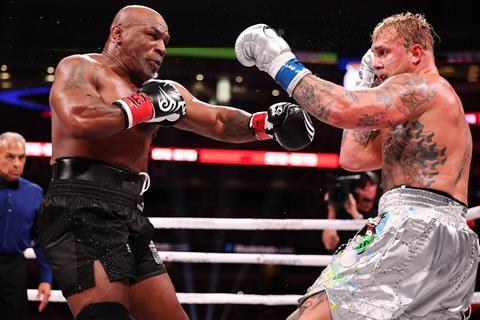Daniel Apostolos is a senior account director at The PHA Group, gives his predictions for the future of live sport after Netflix made its first major broadcast

The sports broadcasting landscape is evolving at a rapid pace, and the recent Jake Paul vs. Mike Tyson fight broadcast live on Netflix marks a significant turning point. The majority of people who own a Netflix subscription use it to binge-watch on-demand series, films, and documentaries. Netflix’s entry into live sports signals a potential “shake-up” in the world of sports broadcasting. With streaming services already dominating how audiences now consume content, this move raises more questions: Is Netflix hoping that live sports is the next big move? How will this affect the balance of power between emerging players like DAZN and legacy broadcasters like Sky Sports?
Netflix’s entry into live sports
Netflix has long been a disruptor. However, the platform has up until now stayed away from live broadcasts, instead focusing on scripted content, documentaries, and reality shows. The Paul-Tyson fight marks a potential shift. It’s clever. Tap into that older Tyson boxing audience from the 1980’s but at the same time, capture the minds of the younger demographic of boxing fans who have bought into this exciting new world of boxing entertainment.
Undeniably the move is strategic. Sport has the ability to unite millions of people and live sport commands that attention in real time. I think boxing has found a niche with the evolution of Misfits Boxing and YouTube influencers challenging more traditional athletes and they are capiltilizing on that expertly. The audience keeps showing up and the 100+ million views generated by the Paul vs Tyson fight just proves that.
For Netflix, entering this space isn’t just about diversifying its content —it’s about keeping up with rivals like Prime Video and Apple TV+ who are already investing heavily in live sports.
The rise of DAZN and the fight for niche audiences
While Netflix is just dipping its toes into live sports, platforms like DAZN have been delivering live and on-demand sports content, including boxing, MMA, and football for several years now. In the UK, DAZN has become to go to place for boxing fans, offering pay-per-view and subscription options that appeal to a younger, digital-savvy demographic.
Younger audiences are more likely to consume content via mobile devices and streaming platforms, prioritising convenience and cost. DAZN offers both, challenging the traditional subscription bundles offered by broadcasters like Sky Sports. Its global reach and tailored packages mean it can attract niche audiences while scaling its offerings to include major sports properties.
Traditional broadcasters face growing pressure
Legacy broadcasters like Sky Sports and TNT Sports face an uphill battle . For decades, they owned exclusive rights to marquee events like Premier League football, Formula 1, and the Ashes to maintain dominance. However, their high subscription costs and lack of on-demand flexibility increasingly alienate younger audiences.
Streaming services, by contrast, do the opposite. They offer lower-cost subscriptions, greater personalization, and the ability to stream content across multiple devices.
What the future holds
The Paul-Tyson fight could be a one-off experiment or the beginning of a broader strategy for Netflix. If successful, we may see the platform bidding for larger properties, potentially reshaping how sports are consumed globally. For DAZN, the challenge will be scaling its success in niche sports to compete directly with both streaming giants and traditional broadcasters. Meanwhile, Sky Sports and TNT Sports must continue to innovate, leveraging their existing rights and investing in streaming technology to stay relevant.
Earlier this month I was in attendance at the Broadcast Sport Summit and the topic of bringing a big global audience into your sport was discussed on one of the panels. My takeaway from those discussions is that the future of sports broadcasting will likely be a fragmented one, with traditional broadcasters, streaming platforms, and specialist services like DAZN coexisting with innovation and audience demand shaping exactly what that looks like in the future.

Daniel Apostolos is a senior account director at The PHA Group







No comments yet